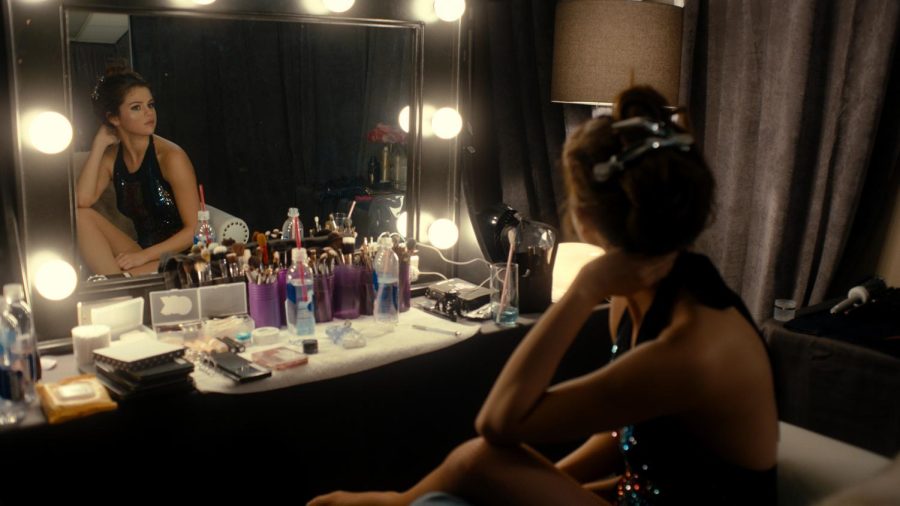‘My Mind and Me’: heartfelt tribute to complexities of minds
November 18, 2022
“When I was a kid, I was terrified of thunderstorms,” a statement most everyone can relate to. Thunderstorms are a scary force, the potential damage being so harmful it can uproot someone’s entire life.
Selena Gomez’s new documentary “My Mind and Me” is a powerful testament to the scary force that is her mind. Similar to thunderstorms, these thoughts create a strong presence in her brain with the potential to cause severe harm.
Streaming on Apple TV since Nov. 4, the singer has dealt with multiple mental health issues due to the immense amounts of pressure that come with her career and her lupus, a chronic long-term disease that causes her to feel pain and swelling in her joints constantly.
Starting off with snippets from her journal and continuing with clips of her life dating back to 2016, “My Mind and Me” is a window into Gomez’s brain. She includes beautiful shots in between these clips of just herself in black and white, with her handwritten entries fading in and out of the screen, a mesmerizing personal touch to an already personal story.
She reveals parts of herself that she hasn’t before, stripping down the glamorous facade of a Disney kid turned pop star and allowing us to see the truest version of herself: someone who is not okay.
Being able to reveal this aspect of yourself is extremely difficult and Gomez noted in an interview with Rolling Stone that this sort of project was so nerve-wracking she almost didn’t agree to have it released.
Gomez suffers from bipolar disorder, anxiety issues and severe depression, undergoing an intense period of psychosis in 2018 that led to her BPD diagnosis.
She did not know if she was going to live. And, at that point, she didn’t know if she wanted to.
Recently, mental health has started to be taken more seriously by authoritative figures and the public. What once was seen as an admission of defeat or cowardice is now being viewed as a stance of bravery, especially when you’re able to admit that you need help.
But it’s still not enough. Every day about 125 Americans die by suicide. Yet people who feel this way still aren’t given the resources they need to make the change in their life that’s necessary to help them live. The simplest question: Why?
Gomez revealed in her documentary that the best way to erase the stigma surrounding mental health is by creating a curriculum in schools that allow students to talk about their feelings. And not with a counselor or as a suggestion —this course would be required like a science or math class.
Gomez met with President Joe Biden earlier this year to pitch her curriculum and was part of the first-ever Youth Action Forum on Mental Health held in the White House.
While this feat is certainly remarkable, the most notable part of the documentary wasn’t her achievements and hard work surrounding mental health charities. It was her vulnerability.
As a celebrity, she’s often reduced to a fictional character. People don’t regard her as someone with feelings. Instead, they talk about her life and her relationships as if it’s a spectacle and Gomez is the main attraction.
Being able to open herself up to scrutiny and praise, delving into how these words thrown at her actually hurt is a powerful way to let the public know that she is a real person.
“My Mind and Me” also paves way for non-celebrities to feel seen in the world. She has become a voice for people who feel voiceless, a light for those who feel engulfed by their own darkness.
Gomez’s documentary is nothing short of a mirror being held up to those who believe that no one can understand what they’re going through. She mentions her past and the ghosts that come with it but also talks about her present and future, a hopeful nod towards a better life and a beautiful realization that we can also feel that way someday.
“My Mind and Me” is a powerfully raw glimpse into Gomez’s struggles, but rather than making it into a “tell all” documentary about her past relationships or her career, she creates something much better: a love letter to her brain, who’s complexities she may never understand, but she’s learned to live with and grow from.
Gomez is not her past and neither are we. The past can be a hauntingly beautiful reminder of why things happened and footnotes of better things to come.
The documentary shares many personal and hard-hitting statements, but the most enticing and the best encapsulation of life: “What has been is not what will be.”







